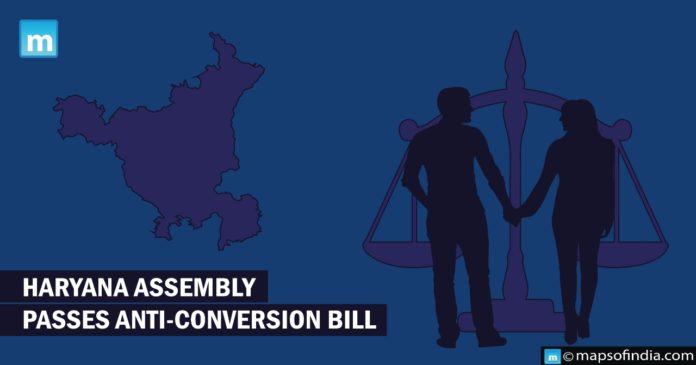On Tuesday, the Haryana State Assembly passed the “Haryana Prevention of Unlawful Conversion of Religion Bill, 2022”. As the name suggests, the bill prohibits forceful, coercive, and fraudulent religious conversions. It states that it provides individuals with the right to freedom of consciousness and protects the vulnerable section of the society from being converted to other religions either by force or under the influence of some false promise.
Why is the bill so controversial?
It is considered controversial as many think that the bill is said to be against a particular religion. The right to freedom of religion was being violated by putting unnecessary fear into people’s minds over religion.
Oppositions parties openly protested the introduction of this bill ever since it was tabled on March 4 of the ongoing Haryana Vidhan Sabha session. As it came up for discussion, many opposition leaders raised a strong objection. During the introductory session of the bill, Congress MLA Raghuvir Singh Kadian from Jhajjar district of Haryana went ahead to tear its copy. This abrupt act in the Sabha caused anger amongst the ruling party, which led to the suspension of the MLA from Sabha as he did not apologize for his behaviour.
What does the state government say about the bill?
Chief Minister Manohar Lal Khattar-led BJP government in Haryana denied any hidden agenda behind the bill. The Home Minister of Haryana Anil Vij refuted the allegations by reading provisions of the bill and told how it did not mention any religion and covered all sections of the society.
Khattar made his mind the previous year about the bill because of an incident in Faridabad’s Ballabhgarh, where a Hindu girl was shot dead outside her college by a Muslim man persuading her to marry him. After the incident, the Chief Minister called for an immediate bill against Love Jihad and forceful conversion.
What provisions are expected in the bill?
- The bill prohibits forceful, coercive, and fraudulent religious conversions from one religion to another by “misrepresentation force, fraud, undue influence, coercion, and allurement or marriage”. It seeks to protect the individual’s right to freedom of consciousness and states that there is no collective right to proselytize.
- The bill strives to safeguard vulnerable and gullible sections of society from being converted to other religions, either under force or influence, by delivering strict punishment for religious conversion in minors, women, Scheduled Castes, and tribals related cases.
- Also, if one desires to convert or change his religion, shall give a declaration to District Magistrate or the Additional district magistrate that he wishes to convert their religion and with their free consent.
If found guilty, the individual shall be imprisoned for a term that shall not be less than one year but may extend up to 5 years and liable to a fine.
How many other states have passed the Anti-Conversion Bills?
At least nine states in India have passed the Anti-Conversion Bills, including Uttar Pradesh, Himachal Pradesh, Gujarat, Chhattisgarh, Odisha, Madhya Pradesh, Arunachal Pradesh, Uttarakhand and Jharkhand.










